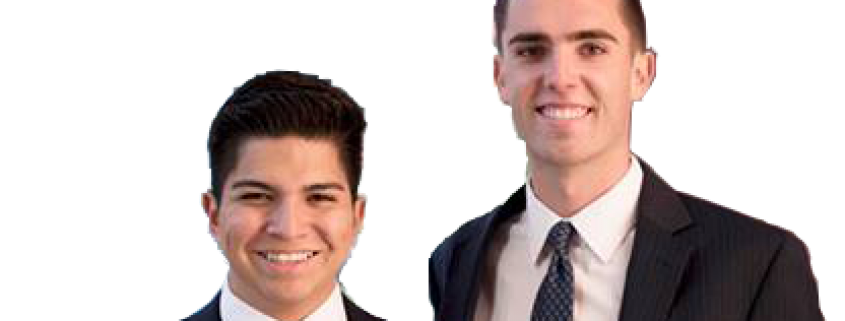Q&A: USG Presidential Ticket Edwin and Austin
Daily Trojan: What is the key issue you’re hoping to tackle?
USG Vice Presidential Candidate Austin Dunn: I don’t think there’s one overlying issue we’re trying to tackle. The bottom line is we’re very passionate about advocating on behalf of students and meeting the student need, and we see where that need is, and we know that we’re equipped enough and have the experience to make that need turn it to reality. Whether that’s incorporating free laundry on campus or extending dining hall hours during major breaks for students who either can’t afford to go home or choose not to go home, there’s literally a plethora of different platform points across the board, and I think that just arose from us listening to students and thereby going to create action for what the need is.
DT: Are you planning on continuing advocacy for college affordability and if so how?
USG Presidential Candidate Edwin Saucedo: What we want to do is first be able to understand where administration is coming from, and what they can and can’t do. For example, one thing we talked about in our meeting last week is that they’re not going to give us salaries for specific positions so just understanding what’s feasible and making sure we have a seat at the table and are bringing up these issues.
DT: What do you think the role of diversity is on campus, in campus conversations as we move into this next presidency?
ES: We want to not only increase space for cultural resource centers but we also want to have in-house counselors that look like people like us, to make sure that when you’re talking to a counselor you feel comfortable sharing your experience and sharing your background because it could be very intimidating to go into the counseling center over at Engemann right now if someone doesn’t look like you to have to validate your experience to them and tell them, “This is how I feel as a brown person on campus” … and them maybe thinking, “Yeah I have to validate them, but I don’t really relate to them.”
DT: What do you see as the role of greek life on USC’s campus?
AD: Some of the greatest student leaders I know, some of the most passionate people on campus, happen to be greek, so I think there’s more than just all of the issues that we’re hearing about but there definitely is more integration that needs to be happen. If we’re saying that we’re having a greek meeting, that’s not just going to mean PHC and IFC that’s a simple change that we’re going to start with, but I think the definition of the word greek on this campus needs to change.
DT: Can you elaborate on your plans for sexual assault prevention?
ES: We want to decrease the [response] time by having more staff available to our students, and I think that now that the racial bias reporting form is live, that also goes to the Title IX office, so yes, our University is making avenues for students to be able to report all these different issues, but how long is it going to take for you to get answers on something that happened to you? The other thing that we wanted to do is prevention and response programs.
DT: How do you plan to continue to mental health advocacy on campus?
ES: Recently USC released a video that said there’s 3,000 first-generation college students. As a first-generation college student, you often don’t want to ask for help or you’re afraid to ask for help. The best way to ask for help is to be able to go to someone that you feel comfortable with. That could be a great way to start with the cultural resource centers, because a lot of these students are already going to those centers and can take advantage of those services without feeling like, “Oh, I have to go all the way to Engemann to get mental health [services].”
DT: Would you make any modifications to Sustainability 2020?
ES: We want to contribute to the Green Engagement Fund … we want to make sure that not only contributing to them but working alongside with them to make sure that some of the projects that they’re doing, maybe we can take them on and get those implemented through administration so that USC can pay for them.
DT: Can you tell us about your plans to address the spring admit, transfer and commuter student communities?
ES: One of the things we want to do with spring admits specifically is work with the [Peer Leadership Consultants] to make sure that they’re being paired with someone who understands some of the campus clubs that are around and already available and is able to recommend, based on your interests, what kind of clubs you could go be going to. With the commuter student lounge, now that there’s new space opening up at the University Village that’s prime opportunity to be able to offer space for students to not only have a lounge but also have lockers because a lot of students carry heavy books and can’t be carrying them from class to class when they’re here all day, most commuter students block their schedules so that they only have to come to campus a couple of days a week so we want to make sure that during those days that they’re coming to campus they have access to lockers to put their stuff in between classes.

